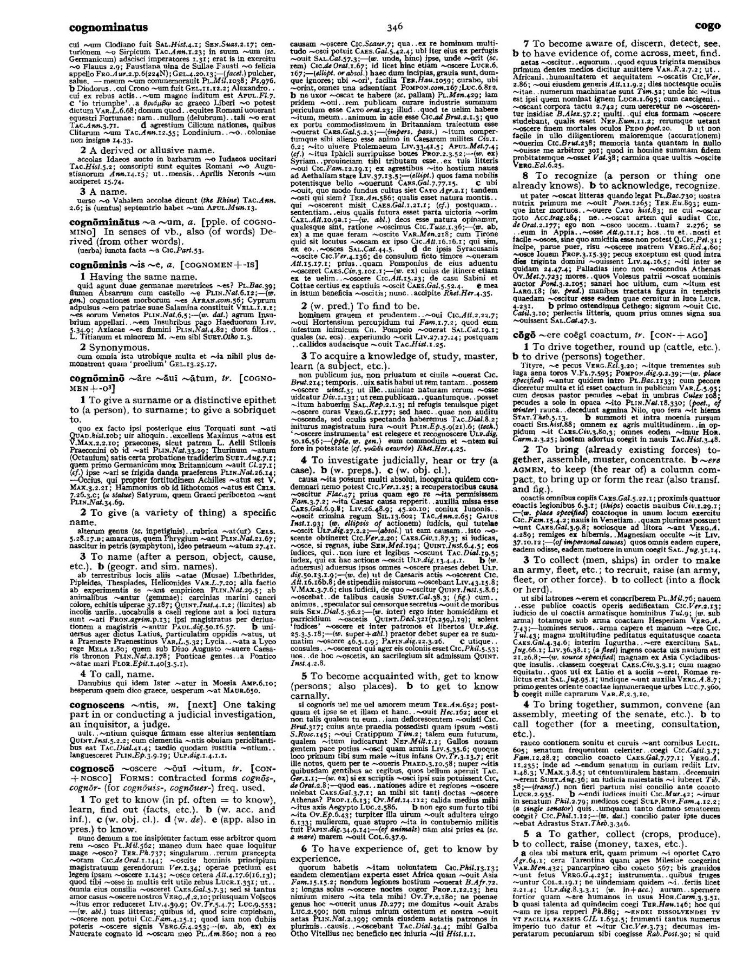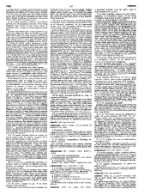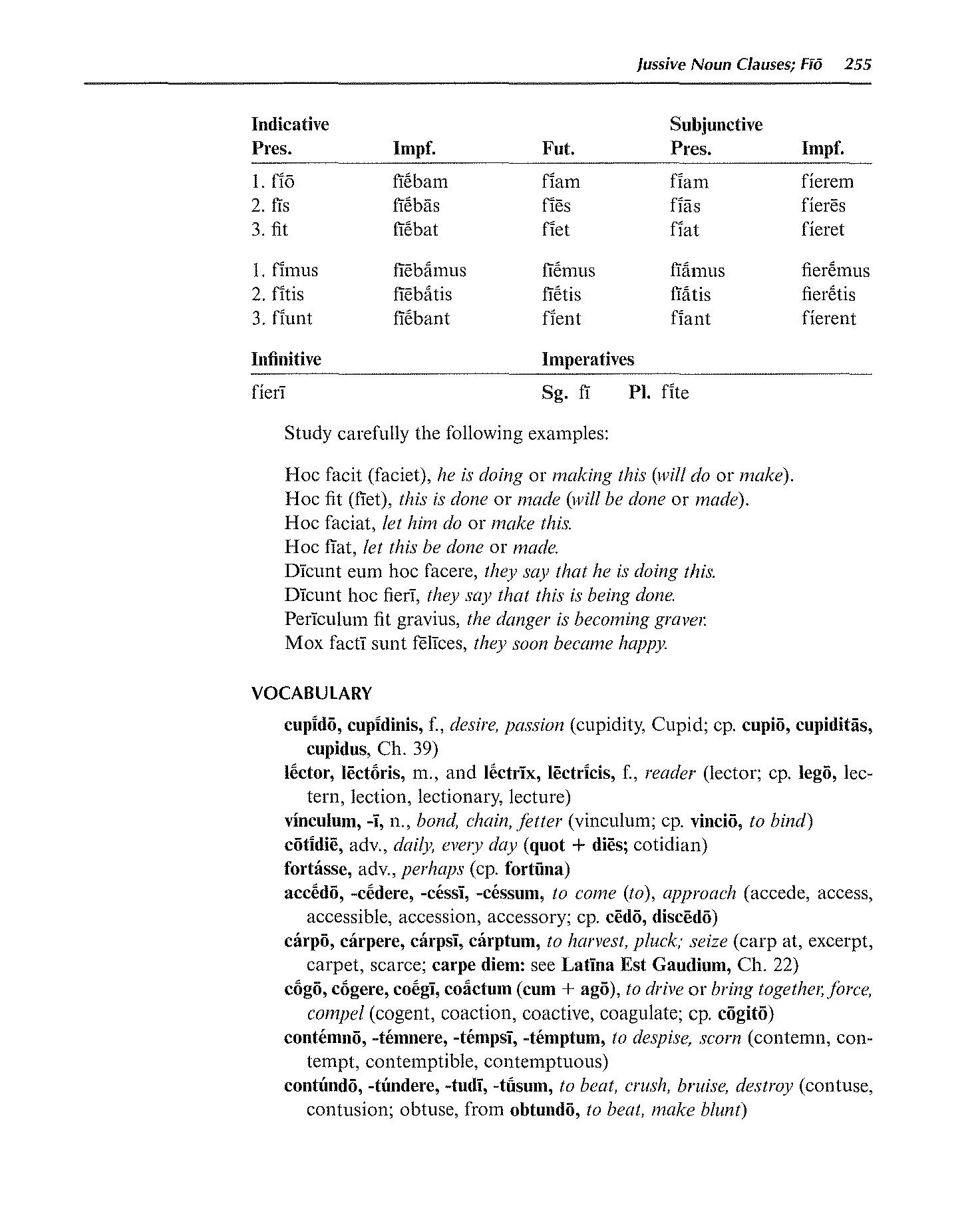
page_listing.tpl
page_subListingDetails.tpl
sub_listingDetails_style1.tpl
sub_listingDetails.title.tpl
cōgere to bring together
cōgere is a Latin Verb that primarily means to bring together.
Definitions for cōgere
Wheelock's Latin
Verb
- 1
to drive or bring together, force, compel
English derivatives:
cogent coaction coactive coagulate
Oxford Latin Dictionary
Verb
- 1
To drive together, round up (cattle, etc.). (b) to drive (persons) together.
- 2
To bring (already existing forces) together, assemble, muster, concentrate. (b) ~ere AGMEN, to keep (the rear of) a column compact, to bring up or form the rear (also transf. and fig.).
- 3
To collect (men, ships) in order to make an army, fleet. etc.; to recruit, raise (an army, fleet, or other force). (b) to collect (into a flock or herd).
- 4
To bring together, summon, convene (an assembly, meeting of the senate, etc.). (b) to call together (for a meeting, consultation, etc.).
- 5
(a) To gather, collect (crops, produce). (b) to collect, raise (money, taxes, etc.).
Sentences with cōgere
Latin to English
Coēgērunt eum īre.Compare They forced him to go.
Acerbus et miser sum, qui fateor ego fortuna noster cogo.Compare It is a bitter and sad thing, which our fortune compels us to confess.
Cur senatus cogo, qui laudo semper, reprehendo?Compare Why am I compelled to blame the senate, which I have always praised?
Populatio ager atque incendium villa cogo obsessus egredior urbs.Compare By the laying waste of the fields and the burning of their country-houses he forced the besieged to come out of the city.
Conjugation table for cōgere
Cactus2000
| ACTIVE | |
| Indicative present | Indicative imperfect |
| cōgō cōgis cōgit cōgimus cōgitis cōgunt | cōgēbam cōgēbās cōgēbat cōgēbāmus cōgēbātis cōgēbant |
| Indicative perfect | Indicative pluperfect |
| coēgī coēgistī coēgit coēgimus coēgistis coēgērunt / coēgēre | coēgeram coēgerās coēgerat coēgerāmus coēgerātis coēgerant |
| Indicative future | Indicative future perfect |
| cōgam cōgēs cōget cōgēmus cōgētis cōgent | coēgerō coēgeris coēgerit coēgerimus coēgeritis coēgerint |
| Subjunctive present | Subjunctive imperfect |
| cōgam cōgās cōgat cōgāmus cōgātis cōgant | cōgerem cōgerēs cōgeret cōgerēmus cōgerētis cōgerent |
| Subjunctive perfect | Subjunctive pluperfect |
| coēgerim coēgeris coēgerit coēgerimus coēgeritis coēgerint | coēgissem coēgissēs coēgisset coēgissēmus coēgissētis coēgissent |
Infinitive present cōgere Infinitive perfect coēgisse Infinitive future coāctūrum esse | Imperative present cōge cōgite Imperative future cōgitō cōgitō cōgitōte cōguntō |
| PASSIVE | |
| Indicative present | Indicative imperfect |
| cōgor cōgeris cōgitur cōgimur cōgiminī cōguntur | cōgēbar cōgēbāris / cōgēbāre cōgēbātur cōgēbāmur cōgēbāminī cōgēbantur |
| Indicative perfect | Indicative pluperfect |
| coāctus sum coāctus es coāctus est coāctī sumus coāctī estis coāctī sunt | coāctus eram coāctus erās coāctus erat coāctī erāmus coāctī erātis coāctī erant |
| Indicative future | Indicative future perfect |
| cōgar cōgēris / cōgēre cōgētur cōgēmur cōgēminī cōgentur | coāctus erō coāctus eris coāctus erit coāctī erimus coāctī eritis coāctī erunt |
| Subjunctive present | Subjunctive imperfect |
| cōgar cōgāris / cōgāre cōgātur cōgāmur cōgāminī cōgantur | cōgerer cōgerēris / cōgerēre cōgerētur cōgerēmur cōgerēminī cōgerentur |
| Subjunctive perfect | Subjunctive pluperfect |
| coāctus sim coāctus sīs coāctus sit coāctī sīmus coāctī sītis coāctī sint | coāctus essem coāctus essēs coāctus esset coāctī essēmus coāctī essētis coāctī essent |
Infinitive present cōgī Infinitive perfect coāctum esse Infinitive future coāctum īrī | Imperative present cōgere cōgiminī Imperative future cōgitor cōgitor - cōguntor |
| PARTICIPLE | ||
| Participle present active | ||
| Nom. | cōgēns | cōgentēs |
| Gen. | cōgentis | cōgentium |
| Dat. | cōgentī | cōgentibus |
| Acc. | cōgentem | cōgentēs |
| Abl. | cōgente | cōgentibus |
| Participle future active | ||
| Nom. | coāctūrus | coāctūrī |
| Gen. | coāctūrī | coāctūrōrum |
| Dat. | coāctūrō | coāctūrīs |
| Acc. | coāctūrum | coāctūrōs |
| Abl. | coāctūrō | coāctūrīs |
| Participle perfect passive | ||
| Nom. | coāctus | coāctī |
| Gen. | coāctī | coāctōrum |
| Dat. | coāctō | coāctīs |
| Acc. | coāctum | coāctōs |
| Abl. | coāctō | coāctīs |
| Gerundive | ||
| Nom. | cōgendus | cōgendī |
| Gen. | cōgendī | cōgendōrum |
| Dat. | cōgendō | cōgendīs |
| Acc. | cōgendum | cōgendōs |
| Abl. | cōgendō | cōgendīs |
| Gerund | Supine | |
| Nom. | cōgere | coāctum |
| Gen. | cōgendī | coāctū |
| Dat. | cōgendō | |
| Acc. | cōgendum | |
| Abl. | cōgendō | |
Data sources
Notes
- Definitions
- Frederick M. Wheelock, Wheelock's Latin, 6th ed., rev. Richard A. LaFleur (New York, NY: HarperCollins Publishers, 2005): 255.
- P. G. W. Glare, Oxford Latin Dictionary, Vols. 1-8 (Oxford: Clarendon Press, 1982): 346.
- Word frequencies
- Christopher Francese, "Latin Core Vocabulary," Dickinson College Commentaries, last modified 2014, http://dcc.dickinson.edu.
- Paul B. Diederich, The Frequency of Latin Words and Their Endings, PhD diss., (Columbia University, 1939).
- Louis Delatte, Suzanne Govaerts, Joseph Denooz, and Etienne Evrard, Dictionnaire fréquentiel et index inverse de la langue latine [Frequency Dictionary and Inverse Index of the Latin Language] (Liège, Belgium: Laboratoire d'analyse statistique des langues anciennes de l'Université de Liège [L.A.S.L.A.], 1981): 120.
Bibliography
Allen, Joseph H. Allen and Greenough's New Latin Grammar for Schools and Colleges: Founded on Comparative Grammar. Edited by James B. Greenough, George L. Kittredge, Albert A. Howard, and Benjamin L. D'Ooge. Boston, MA: Ginn & Company, 1903.
Crystal, David. A Dictionary of Linguistics and Phonetics. 6th ed. Oxford, UK: Blackwell Publishing, 2008.
Delatte, Louis, Suzanne Govaerts, Joseph Denooz, and Etienne Evrard. Dictionnaire fréquentiel et index inverse de la langue latine [Frequency Dictionary and Inverse Index of the Latin Language]. Liège, Belgium: Laboratoire d'analyse statistique des langues anciennes de l'Université de Liège (L.A.S.L.A.), 1981.
Diederich, Paul B. The Frequency of Latin Words and Their Endings. PhD diss., Columbia University, 1939.
Francese, Christopher. "Latin Core Vocabulary." Dickinson College Commentaries. Last modified 2014. http://dcc.dickinson.edu/latin-vocabulary-list.
Gildersleeve, Basil L., and Gonzales Lodge. Gildersleeve's Latin Grammar: Third Edition, Revised, and Enlarged. 3rd ed. London, England: Macmillan and Co., 1903.
Glare, Peter G.W. Oxford Latin Dictionary. Vols. 1-8. Oxford, England: Clarendon Press, 1982.
Krüger, Bernd. "Latin Conjugation Tables." Cactus2000. Accessed May 5, 2023. https://latin.cactus2000.de/index.en.php.
Pierson, Nick. "Sound of Text." Accessed October 26, 2019. https://soundoftext.com.
Wheelock, Frederick M. Wheelock's Latin. 6th ed. Revised by Richard A. LaFleur. New York, NY: HarperCollins Publishers, 2005.
Wiktionary Contributors. "Victionarium." Wikimedia Foundation, Inc. Updated March 18, 2019. https://la.wiktionary.org/wiki/Victionarium:Pagina_prima.
Citation
Chicago (17th ed.)
Allo Contributors. "cōgō, cōgere, coēgī, coāctum (v.) - Latin Word Definition." Allo Latin Dictionary. Last modified . Accessed January 30, 2026. http://ancientlanguages.org/latin/dictionary/cogo-cogere-coegi-coactum.
Entry created on . Last updated on .








